

The book Art Deco Mailboxes by Karen Greene and Lynne Lavelle is a wonderful survey of the iconic mailboxes installed in American buildings in early 20th cenetury. Seeing just one still extant in a building today is a treat, but viewing them all together gives a sense of the range of styles and how they reflected, in detail, the architectural prowess of the skyscrapers within which they were situated. As the book shows, the Art Deco mailboxes (also known as letter boxes) of this time period were also in residential buildings, offices, hotels and more, and many, polished daily, are still in use.
Working with the publisher W.W. Norton, we are able to share with you this sample of 14 beautiful letter boxes in New York City from the book Art Deco Mailboxes. Although we have focused on New York City for this piece, the book includes mailboxes from all the major American cities during this era including Boston, Chicago and Philadelphia.
In the beginning, the patented Cutler U.S. Mail chute was considered, “as necessary to the businessman as the elevator,” as proclaimed by the unknown author of the book The Industries of the City of Rochester in 1888. Inventor and architect James Goold Cutler was born in Albany but lived in Rochester, then a hub of commerce where he created the successful Cutler letter box and chute system that spread across America. It is the Cutler company trademark, the bald eagle, that graces the front of many of the mailboxes seen today.
But by the 1980s with newer efficient method of sorting mail, only a few new mail chutes were constructed and in 1997, the National Fire Protection Association banned the use of mail chutes in new buildings. Now they remain a beloved remnant of an earlier era.
Here, take a look at 14 of the many vintage letter boxes from the book Art Deco Mailboxes:
1. 200 Madison Avenue
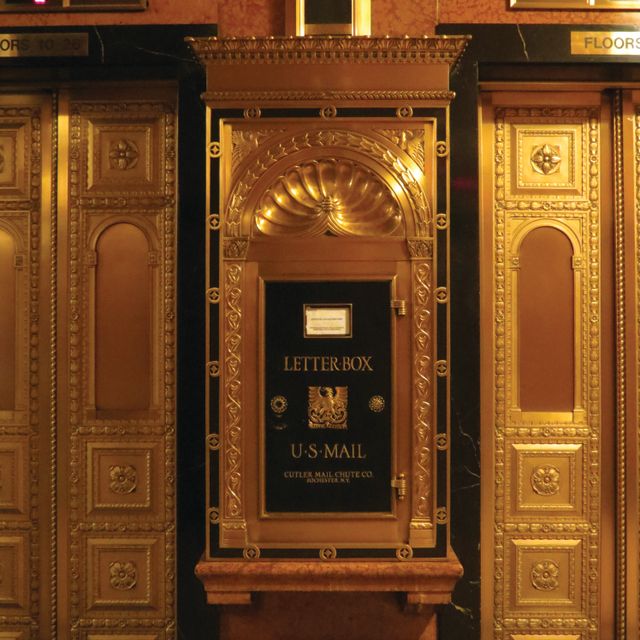
Image via Art Deco Mailboxes
200 Madison Avenue is a building designed by Warren and Wetmore, the firm responsible for Grand Central Terminal, Yonkers Train Station, the original Chelsea Piers and the haunting Michigan Central Station. The relatively simple exterior of 200 Madison Avenue hides the ornamentation on the elevator doors and the Cutler letter box chute.
2. The Empire State Building
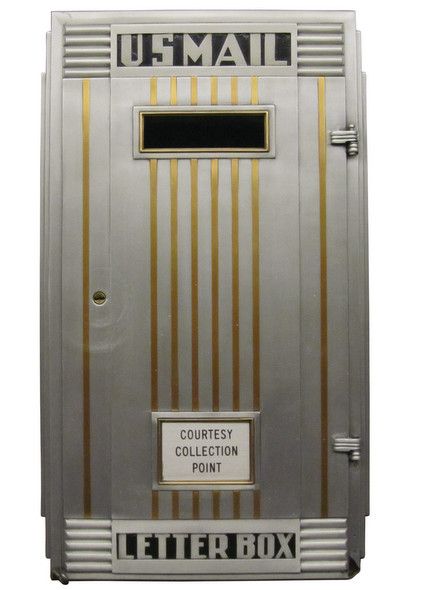 Image via Art Deco Mailboxes
Image via Art Deco Mailboxes
The letter box at the Empire State Building certainly reflects the linear Art Deco lines of the landmark skyscraper, with the US MAIL and LETTER BOX in the same font seen on the building exterior.
Buy tickets online to the Empire State observatory and save 10%
3. The Chrysler Building
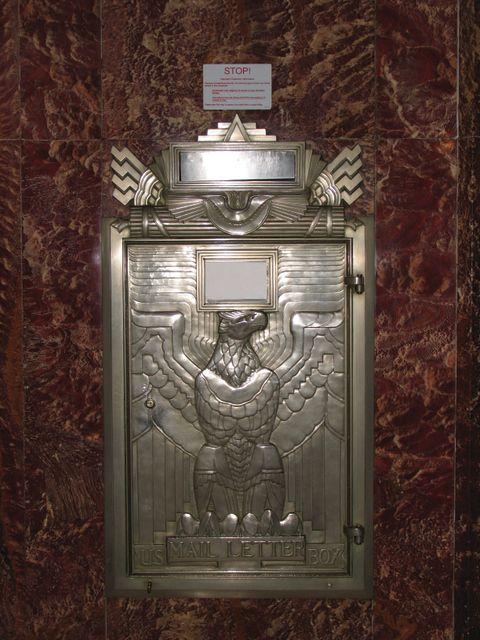
Image via Art Deco Mailboxes
Stylistically, the treatment of the metal on the Chrysler Building letter box is quite similar to that of the exterior ornament on the building, like the iconic eagles on the 61st floor and the “hubcaps” on the spire. This is not surprising, given that the Chrysler Building was a customized building, hand crafted in sheet metal shops located on the 65th and 66th floor during construction.
Read about the Top 10 Secrets of the Chrysler Building.
4. 29 Broadway
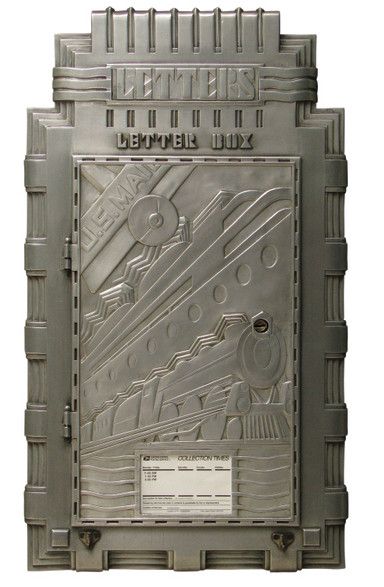 Image via Art Deco Mailboxes
Image via Art Deco Mailboxes
29 Broadway is a narrow building in the Canyon of Heroes with beautiful Art Deco elements on the exterior. The silver mailbox reflects the sleek lobby lined with silvery Cippolino marble walls and an aluminum leaf ceiling. An atypical mail box with a left hinge, this one is decorated with “symbols of progress, modes of travel, and movement of the mail,” write Greene and Lavelle.
5. The Waldorf Astoria Hotel
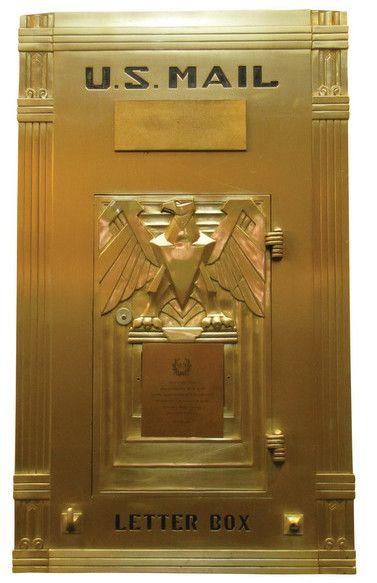 Image via Art Deco Mailboxes
Image via Art Deco Mailboxes
The Waldorf Astoria has four mailboxes in the lobby, designed by architects. Other unique details to spot in the hotel lobby include Cole Porter’s piano, a clock from the Chicago World Fair (with a small Statue of Liberty on top), and a 148,000 piece mosaic, lost under carpeting for many years. Find out more in our Top 15 Secrets of the Waldorf Astoria Hotel.
6. Woolworth Building
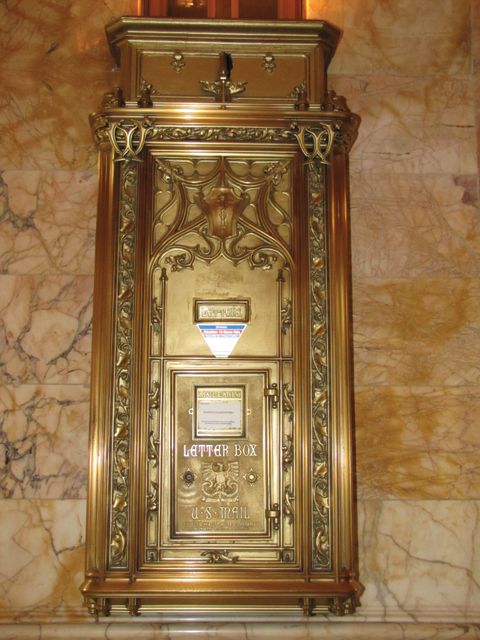
Image via Art Deco Mailboxes
The Woolworth Building letter box contains many of the Gothic motifs that abound on the exterior and interior lobby, including salamanders if you look closely. The amphibian was included as a primary design element in the building because they were once thought to be able to survive fire–a symbol of Woolworth’s claim that the building was fireproof.
Learn about the Top 10 Secrets of the Woolworth Building and join us for next exclusive tour of the building.
7. The Flatiron Building
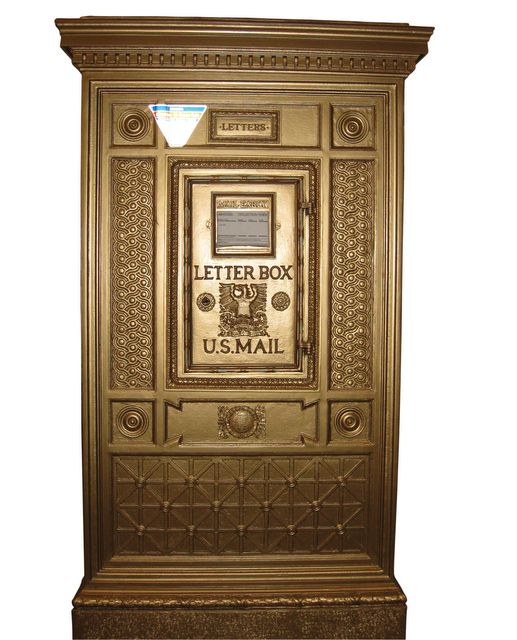 Image via Art Deco Mailboxes
Image via Art Deco Mailboxes
The Flatiron Building mailbox contains the Neoclassical elements that defined the architectural style of Daniel Burnham during this time period, after serving as Director of Works for the World’s Columbian Exposition in Chicago, the famous White City. As such, the pediment top and ornamentation seem befitting of a government building.
8. Trinity Building
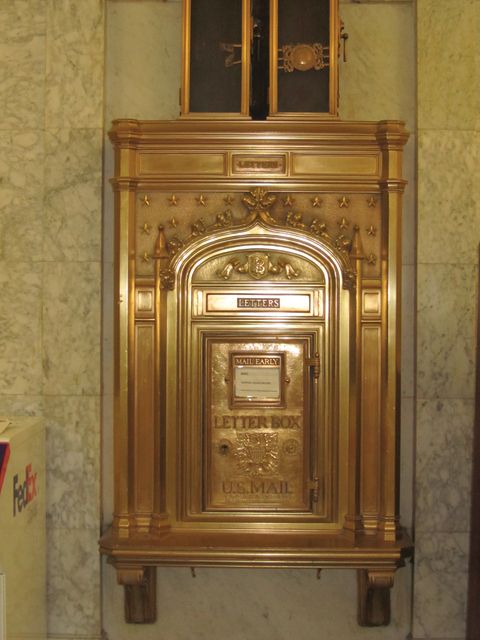
Image via Art Deco Mailboxes
In the lobby of the Trinity Building, the mailbox mimics the gorgeous cathedral-like elevators, also in gold. A visit to this building is a real treat, as is its twin building next door–U.S. Realty. The construction of these two sister buildings required the relocation of Thames Street 28 feet north.
9. Standard Oil Building
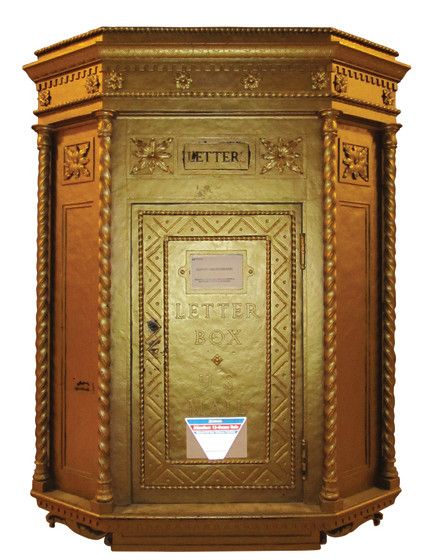
Image via Art Deco Mailboxes
The seriousness of the Standard Oil Building letter box is quite evident in its distinctive shape, as compared to the other Art Deco mailboxes–it could almost be something from a church. In miniature, it reflects the equally solid massing of the Standard Oil Building itself, situated along Bowling Green built in phases from 1885 to 1928 as the company acquired more land and more money. At the top there was once a cauldron of kerosene that burned 24 hours a day, reminding onlookers about the nature of the business inside.
10. The Salmon Tower Building
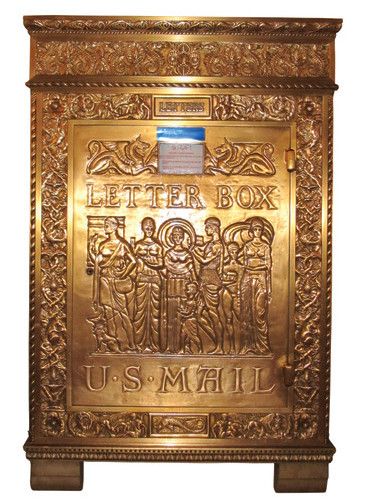
Image via Art Deco Mailboxes
Along 42nd Street next to Bryant Park, you may have noticed a building with an arched stone doorway carved with unique figures representing the months of the year. The highly ornameted letter box in the lobby continues the figurine motif on the facade.
11. 60 Centre Street Courthouse
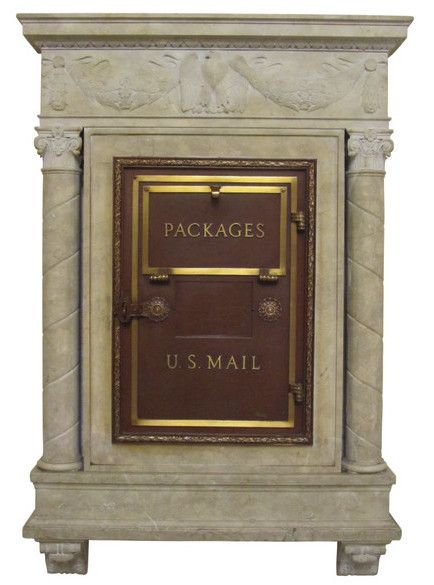
Image via Art Deco Mailboxes
This letter box at the New York County Courthouse on 60 Centre Street is appropriately serious for a judicial institution, all in stone with Corinthian columns and symbolic references.
12. The Apthorp Apartments
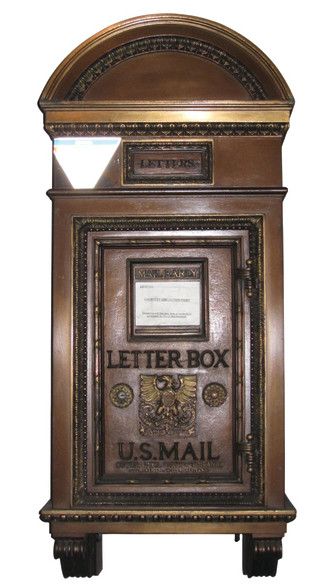 Image via Art Deco Mailboxes
Image via Art Deco Mailboxes
The glorious Apthrop apartment building on 79th Street and Broadway is like an Italian limestone palazzo, with open air garden courtyard in the middle. The letter box too, could be something perhaps found in Rome if it weren’t for the U.S. Mail on the front.
13. St. Regis Hotel
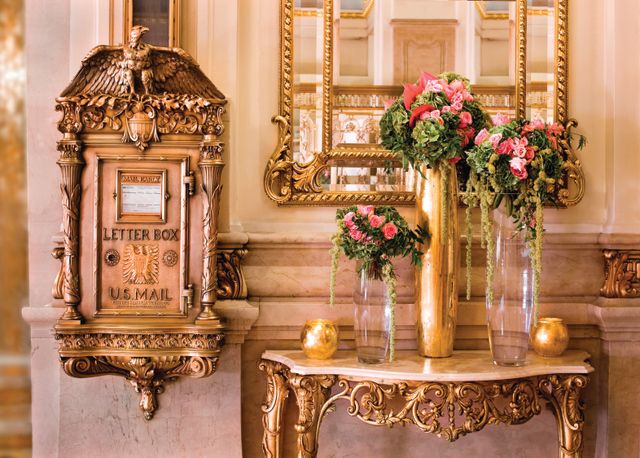
Letter box at the St. Regis Hotel. Image via Art Deco Mailboxes
The letter box at the St. Regis Hotel clearly reflects the lush ornamentation favored in the first decade of the 20th century when the hotel was built. It’s also one of the most decorative in the entire book, topped with a striking eagle with open wings.
14. Former Western Union Building
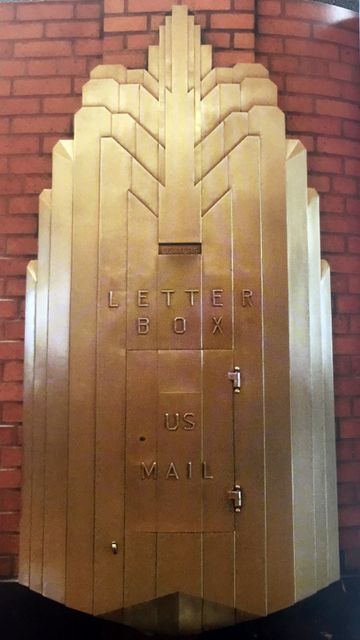
Image via Art Deco Mailboxes
The mailbox at the former Western Union Building on 60 Hudson Street may be one of the most fun, not only for subverting the normal rectangular shape of the letter box but also because it stylistically represents the shape of the building itself with its recognizable setback architecture. This building was such a symbol of Modernism, it was the subject of many a painting by the early abstract artists.
Next, read about 14 beautiful vintage subway entrances in NYC. Check out Art Deco Mailboxes on Amazon.


